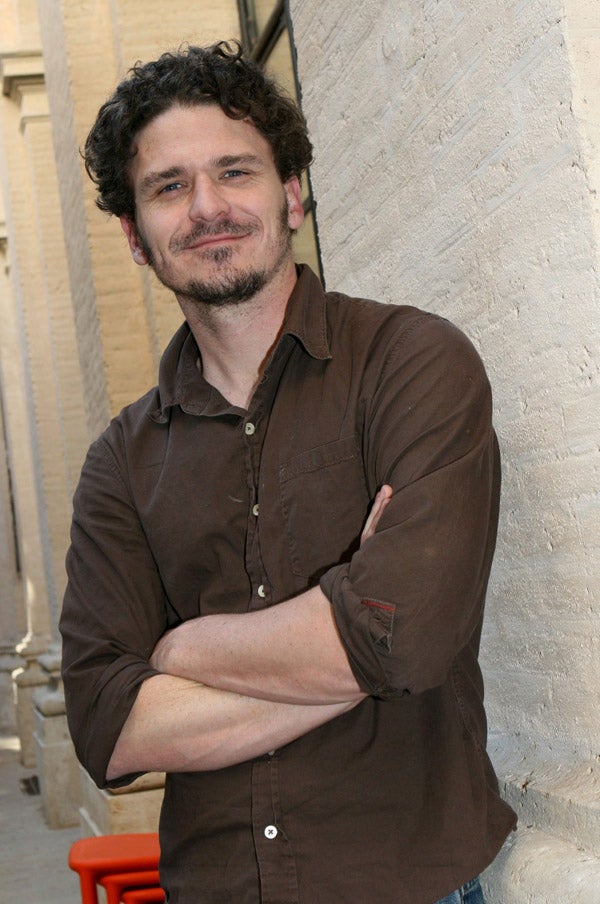The United States of McSweeney's, Edited by Nick Hornby and Eli Horowitz

"Things I have been reading", Nick Hornby's recently retired column from the monthly magazine The Believer, was reassuring for anyone whose rapid acquisition of books outstripped their reading. Each column began with a list of Hornby's "books bought" and "books read" from the month, and the former list was invariably longer than the latter. As he admits in his introduction to this 10th anniversary selection of its short stories, McSweeney's Quarterly Concern is just the sort of beautifully produced publication that even bestselling authors feel compelled to buy, only to leave it conspicuously on a shelf, beloved but unread.
Since 1998, the Quarterly Concern has been printed "roughly four times a year, or definitely at least three". Among its 32 incarnations thus far are a packet of what looks like junk mail (issue 17); a cigar box containing political propaganda as well as fiction (issue 19); and a cover that opens out like an elaborate origami sculpture (issue 21). Alongside the quarterly, Dave Eggers and his boutique publishing house have generated The Believer; Wholphin, a series of short film DVDs; 826 Valencia, a non-profit writing centre for children at the McSweeney's San Francisco HQ; and Voice of Witness, a book imprint capturing the recollections of people affected by human rights crises.
All this furious activity and attention to aesthetic detail may have made McSweeney's a distinctive brand, but it has also been a distraction from the content of its core publication. On the evidence of the 19 stories in this collection, the other 400 or so from the past decade are well worth catching up with, especially if they've been sitting unopened close to your bedside.
The United States of McSweeney's sounds like an off-kilter version of America, and the country its stories portray is indeed skewed by the weight of the authors' imaginations. It's an earnest, inclusive vision, one that frequently prioritises characters from under-represented groups.
K Kvashay-Boyle's "St Chola" describes a hijab-wearing Muslim girl's experience of high school in California. "The Strange Career of Dr Raju Gopalarajan", by Rajesh Parameswaran, takes us to the dark side of the American dream with a dissatisfied, delusional Indian-American, who decides to re-imagine himself as a qualified doctor. "St Chola" is being developed as a feature film, while "The Strange Career..." was one of three stories that won McSweeney's a National Magazine Award for fiction in 2007.
In "The Man Who Ate Michael Rockefeller", Christopher Stokes gives a fabulous fictional account of the titular oil heir's disappearance in the Pacific from the point of view of an Irian Jayan tribesman. The book begins with a story by Roddy Doyle, "I Understand", which also appears in The Deportees, the author's solo collection of short stories about the immigrant experience in Ireland. Doyle's African former child soldier, transplanted to Dublin, recalls Valentino Achak Deng, a Sudanese refugee and the non-fictional hero of Eggers's What Is The What, the first book to emerge (in 2006) from the Voices of Witness project.
Inclusive it may be, but as a product largely of the Bush years, the prevailing tone is more melancholy than hopeful: its stories are peopled with the alienated, the unhappily married and the terminally ill. Philipp Meyer's "One Day All This Will Be Yours" and AM Homes's "Do Not Disturb" are both beautiful, but unrelentingly bleak, tales of familial strife.
Wells Tower, one of US literature's coming men, provides "Executors of Important Energies", from his acclaimed collection Everything Ravaged, Everything Burned. His original descriptions of the familiar world read almost like science fiction. Elsewhere, McSweeney's lives up to its reputation for quirkiness with an occasional excess of grating, magic-realist whimsy.
Many of the McSweeney's superstars are missing. There's no Zadie Smith, Jonathan Lethem, Michael Chabon or David Foster Wallace here. Hornby and his fellow editor Eli Horowitz were keen to include some lesser-known writers, and to point out that not all the unfamiliar names belong to young Frisco hipsters: McSweeney's is not the metropolitan clique of the popular imagination. For instance, 66-year-old Pulitzer Prize-winner Steven Millhauser contributes an intriguing piece of alternative art history, "A Precursor of the Cinema".
The output of Eggers and co is a beguiling combination of cutting-edge content and (forgetting the DVDs and iPhone app) old-school form. The next issue of the Quarterly Concern is to be a single-edition broadsheet newspaper called "San Francisco Panorama". McSweeney's and its makers are in love with printed artefacts of every variety. Let's hope they live to be 20.
Subscribe to Independent Premium to bookmark this article
Want to bookmark your favourite articles and stories to read or reference later? Start your Independent Premium subscription today.

Join our commenting forum
Join thought-provoking conversations, follow other Independent readers and see their replies